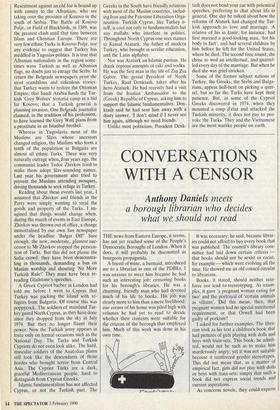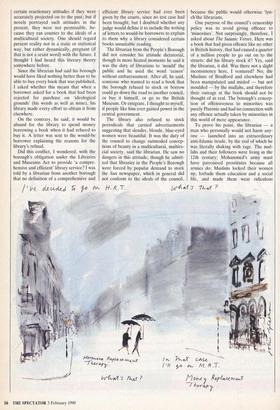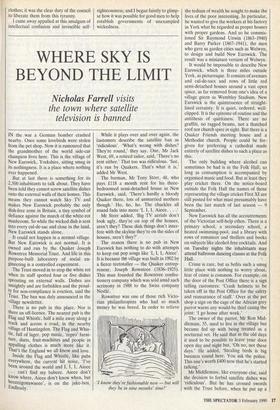CONVERSATIONS WITH A CENSOR
Anthony Daniels meets
a borough librarian who decides what we should not read
THE news from Eastern Europe, it seems, has not yet reached some of the People's Democratic Boroughs of London. When it does, it will probably be discounted as bourgeois propaganda.
A friend of mine, a barmaid, introduced me to a librarian in one of the PDBLs. I was anxious to meet him because he had such an interesting job: censoring books for his borough's libraries. He was a charming, friendly man who had devoted much of his life to books. His job was clearly more to him than a mere livelihood: one corner of his home was piled high with volumes he had yet to read to decide whether their contents were suitable for the citizens of the borough that employed him. Much of this work was done in his own time. It was necessary, he said, because librar- ies could not afford to buy every book that was published. The council's library com- mittee had laid down certain criteria — that books should not be sexist or racist, for example — which were evolving all the time. He showed me an old council circular to librarians.
Books, it stated, should neither rein- force nor lead to stereotyping. As exam- ples, it gave 'a pregnant woman eating for two' and the portrayal of 'certain animals as villains'. Did this mean, then, that pregnant women had no special nutritional requirement, or that Orwell had been guilty of porkism?
I asked for further examples. The libra- rian took as his text a children's book that had pictures of girls playing with dolls and boys with train-sets. This book, he admit- ted, would not be such as to make him murderously angry; yet it was not suitable because it reinforced gender stereotypes.. This did not mean that, as a matter ot empirical fact, girls did not play with dolls or boys with train-sets: simply that such a book did not express social trends and current aspirations.
As concerns novels, they could express certain reactionary attitudes if they were accurately projected on to the past; but if novels portrayed such attitudes in the present, they were not permissible, be- cause they ran counter to the ideals of a multicultural society. One should regard present reality not in a static or statistical way, but rather dynamically, pregnant (if that is not a sexist word) with the future. I thought I had heard this literary theory somewhere before.
Since the librarian had said his borough would have liked nothing better than to be able to buy every book that was published, I asked whether this meant that when a borrower asked for a book that had been rejected for purchase on 'ideological grounds' (his words as well as mine), his library made every effort to obtain it from elsewhere.
On the contrary, he said, it would be absurd for the library to spend money borrowing a book when it had refused to buy it. A letter was sent to the would-be borrower explaining the reasons for the library's refusal.
Did this conflict, I wondered, with the borough's obligation under the Libraries and Museums Act to provide 'a compre- hensive and efficient' library service? I was told by a librarian from another borough that no definition of a comprehensive and
efficient library service had ever been given by the courts, since no test case had been brought; but I doubted whether any judge would define it to include the writing of letters to would-be borrowers to explain to them why a library considered certain books unsuitable reading.
The librarian from the People's Borough did not consider his attitude dictatorial, though in more heated moments he said it was the duty of librarians to 'mould' the public and he used the word 'censor' without embarrassment. After all, he said, someone who wanted to read a book that the borough refused to stock or borrow could go down the road to another council, or buy it himself, or go to the British Museum. Or emigrate, I thought to myself, if people like him ever gained power in the central government.
The library also refused to stock periodicals that carried advertisements suggesting that slender, blonde, blue-eyed women were beautiful. It was the duty of the council to change outmoded concep- tions of beauty in a multicultural, multira- cial society, said the librarian. He saw no dangers in this attitude; though he admit- ted that libraries in the People's Borough were forced by popular demand to stock the Sun newspaper, which in general did not conform to the ideals of the council,
because because the public would otherwise lyn- ch'the librarians.
One purpose of the council's censorship policy was to avoid giving offence to 'minorities'. Not surprisingly, therefore, I asked about The Satanic Verses. Here was a book that had given offence like no other in British history, that had caused a quarter of a million people to go out on to the streets: did his library stock it? Yes, said the librarian, it did. Was there not a slight inconsistency here, I ventured? No; the Muslims of Bradford and elsewhere had been manipulated and misled — but not moulded — by the mullahs, and therefore their outrage at the book should not be thought of as real. The borough's concep- tion of offensiveness to minorities was purely Platonic and had no connection with any offence actually taken by minorities in this world of mere appearance.
To prove his point, the librarian — a man who personally would not harm any- one — launched into an extraordinary anti-Islamic tirade, by the end of which he was literally shaking with rage. The mul- lahs and their followers were living in the 12th century; Mohammed's army must have patronised prostitutes because all armies do; Muslims locked their women up, forbade them education and a social life, and made them wear ridiculous clothes; it was the clear duty of the council to liberate them from this tyranny.
I came away appalled at this amalgam of intellectual confusion and invincible self- righteousness; and I began faintly to glimp- se how it was possible for good men to help establish governments of unexampled wickedness.




















































 Previous page
Previous page